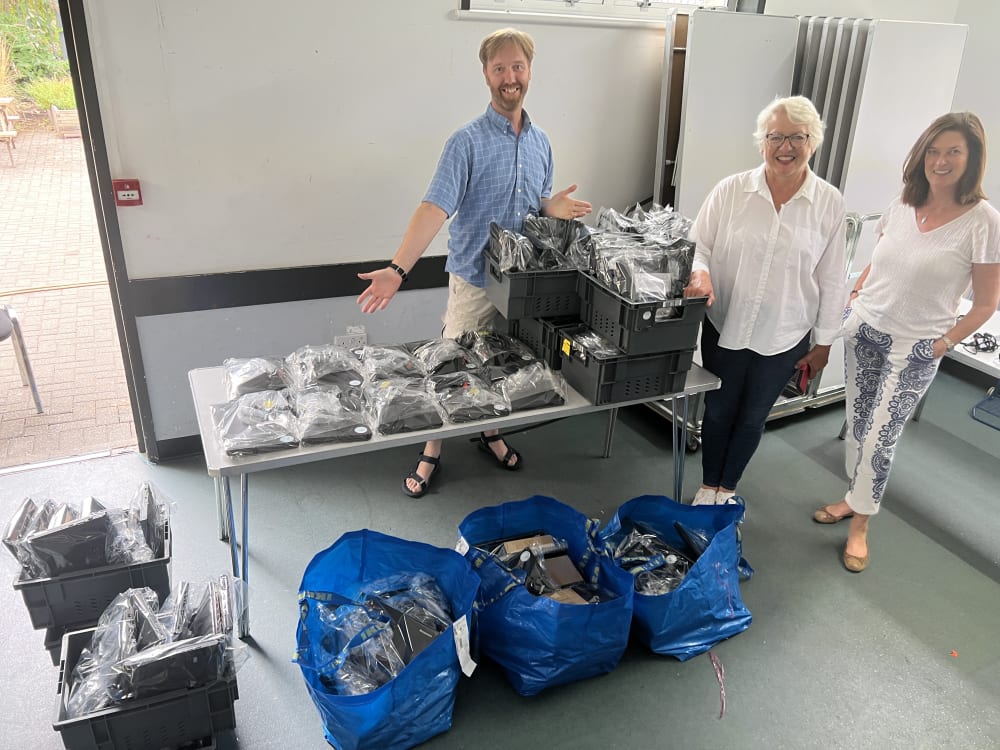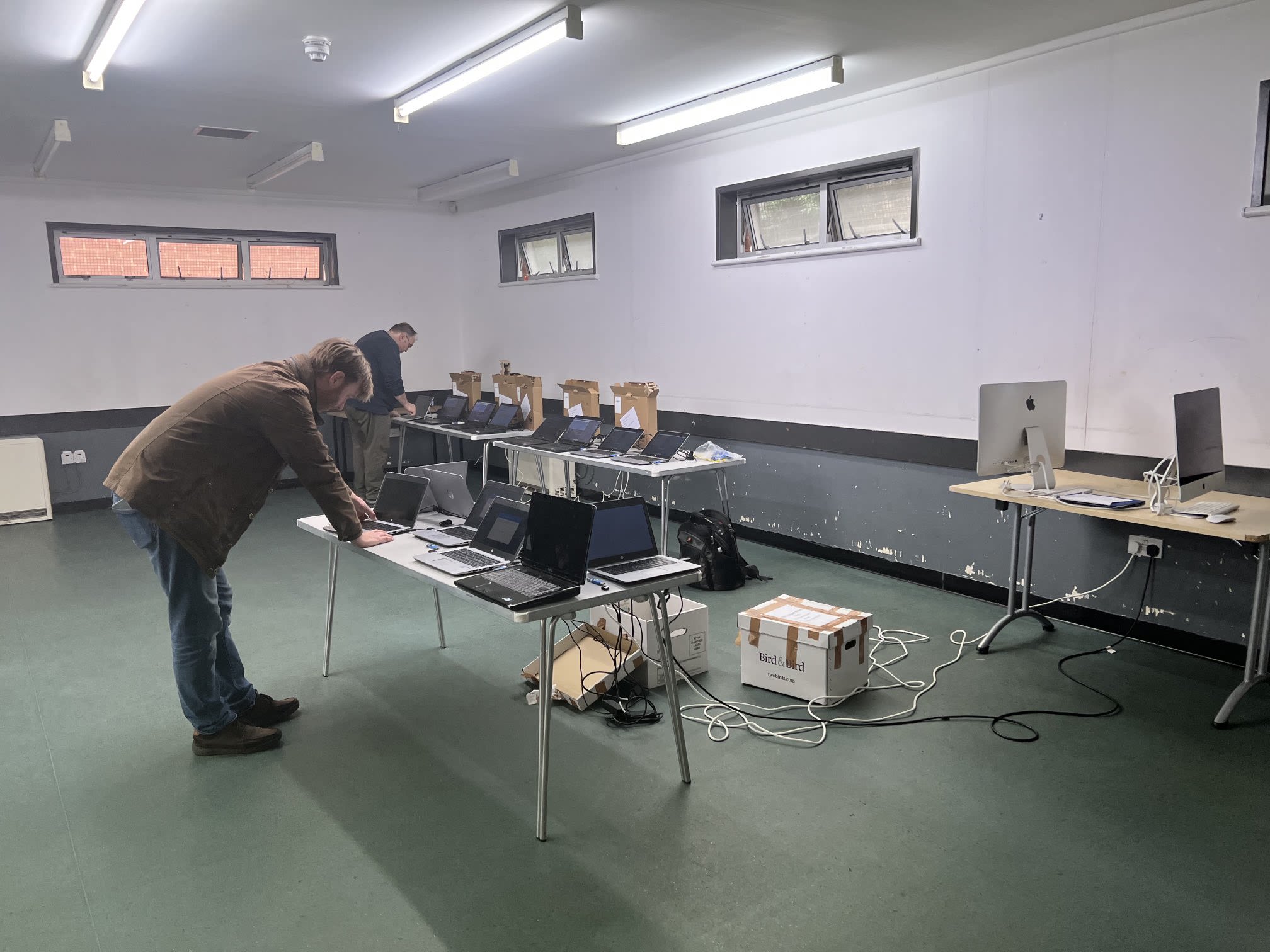
Case study: Addressing digital waste and access to online learning with CCI x Power to Connect

- Written byAnnika Loebig
- Published date 24 November 2022

UAL’s Creative Computing Institute (CCI) worked with not-for-profit Power to Connect (P2C), which addresses digital waste and lack of access to online learning within deprived communities, to develop a data wiping solution to ensure that second-hand devices can be safely repurposed and handed over to young people.
The project was part of 3 UAL initiatives funded by Future Observatory, a national programme coordinated by the Design Museum in partnership with Arts and Humanity Research Council, which brings together researchers, designers and industry representatives to show how design can drive Britain’s future prosperity. Project leads from CCI included Irtiza Nasar and Mick Grierson.
The Challenge
The UK is one of the worst producers of e-waste. In 2016, 24.9kg of e-waste was produced per person in the UK so the potential impact of this project on the reduction of e-waste is significant.
One of the key ways to reduce e-waste is to extend a product's life span by finding a new use for it or by re-using it.
Since many laptops and smart devices are unable to be efficiently wiped, these devices are going to waste. Laptop and smart device waste accounts for 7% of e-waste across the globe with more than 30,000,000 tonnes of e-waste thrown out across the globe.
Our Approach
The overall vision of this project is to:
- Radically reduce e-waste from large companies
- Increase access of digital devices to marginalised young people
- Create a sustainable solution by co-designing and embedding knowledge in Power to Connect
The project’s research borrows from human-centred design and service design methodologies to develop an open-source data wiping tool to ensure that second-hand devices can be safely repurposed and handed over to young people, thereby reducing e-waste and addressing digital inequity.
The Result
The project put together a working MVP to start showcasing the potential benefits of the system and the impact the software can have towards reducing e-waste. The Creative Computing Institute also provided Power to Connect with something they can immediately start using to increase their volunteer capacity and a number of incoming device donations.
This project has been an exciting start to what has potential to be bigger more impactful collaboration with UAL’s Creative Computing Institute. The new system created has meant our volunteer recruitment process can be more flexible, and we can now recruit volunteers from all backgrounds not only from IT specialist backgrounds. - Megan Barrett, Head of Operations at Power to Connect
“I feel like this is just the start to an exciting collaboration and I’m looking forward about see how we can continue working together to find the most effective way to reduce e-waste and ultimately help tackle digital poverty.”

Impact
There are several strategic areas that the project aims to have an impact on with the research findings of the project:
- Through the diversification of devices and scaling
P2C only currently repurposes laptops. With the research findings, they would also be able to develop the technology to wipe other devices for re-use, such as mobile phones and tablets, while also targeting more recent models of laptops and potentially other smart devices.
Furthermore, P2C currently have 65 volunteers and only one permanent staff member. They aim to double the number of trained volunteers by the end of the project hence the project aims to half the entry barrier and training time to use such software by simplifying the current processes. This allows P2C to scale both in terms of onboarding more volunteers with drastically reduced training time involved while also increasing the current output capacity of recycled laptops with existing volunteers.
- Schools
The aim is to redistribute more devices to more schools to address the digital divide. P2C aims to partner with another 300 new schools across London in the next couple of years. The security that this software would provide means that more schools can take part in the scheme without the risk of children and families having access to inappropriate data from hardware not sufficiently wiped and will ensure that P2C can reach its goal.
- Donor organisations
By demonstrating that the software can securely erase data, more potential partners will feel confident in donating their devices and so there will be a greater pool of higher quality devices to redistribute.
- Influence policy
The partners will document their impact on the reduction of e-waste and digital inequity and make a case to local education authorities, borough councils, and national education authorities to use their project as a model to implement similar projects. The partners will make a case for new policies that would encourage organisations to repurpose their digital devices where possible and discourage the practice of discarding useable devices.
- Find out more about Knowledge Exchange at UAL and how you can work with our talented students and graduates.
- If you're interested in collaborating with UAL, get in touch with us! Email us on: business@arts.ac.uk